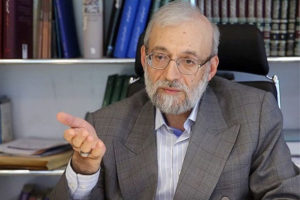June 22, 2018

A senior Iranian official has confirmed that Iran had a working relationship with Al-Qaeda and allowed its members to travel across Iran to and from Afghanistan. The admission reverses years of denials by Iran, which has always said Al-Qaeda was an enemy of Iran and a terrorist group created by the United States.
It was not clear why Iran would decide to admit ties with Al-Qaeda after all these years. But the point appeared to be missed in an effort to deny any involvement in the 9-11 attacks.
The revelation was given May 30 in an interview on Iranian state television with Mohammad-Javad Larijani, the head of human rights issues for the Iranian Judiciary. Moham-mad-Javad Larijani is also the brother of Majlis Speaker Ali Larijani and Judiciary Chairman Sadeq Larijani.
The tape of the interview has subsequently been circulated on social media and has been picked up by conservative news outlets in the United States who said Larijani confirmed an Iranian link to the 9-11 attacks.
Actually, it is much more nuanced than that. In the interview, Larijani quotes from the 2004 report of the US 9-11 Commission appointed to investigate the attacks of September 11, 2001.
That report said there was strong evidence that Al-Qaeda operatives, including some of the 9-11 hijackers, traveled through Iran “on their way to or from Afghanistan, taking advantage of the Iranian practice of not stamping Saudi passports.” It suggests this deserves further investigation. But the report in no way suggested that Iran had any role in the attacks or knew that any of the men crossing Iran were plotting the attacks on New York and the Pentagon.
Many Americans writing on the subject, however, have erroneously said the commission found that Iran had a role.
Iran has consistently over the years denied having any links with Al-Qaeda. US officials have said Iran allowed a number of Al-Qaeda operatives to have sanctuary in Iran and to communicate with those carrying out terrorist acts and to raise funds for Al-Qaeda while living in Iran in addition to allowing passage across Iran without stamping passports.
Larijani effectively confirmed what the 9-11 report said, but did not address the other issue of Al-Qaeda operatives having sanctuary in Iran.
US officials have described the Iran-Qaeda ties as anything but trusting. They have said Iran was effectively holding the Al-Qaeda operatives hostage to prevent Al-Qaeda from taking any further action against Iran. (In the 1990s, Al-Qaeda is believed to have sent an operative to bomb the mausoleum of Imam Reza in Mashhad as part of its strongly anti-Shia ideology.) At the same time, Iran was happy to allow Al-Qaeda to carry out attacks on Americans, without Iran having any direct participation, US officials have long said.
In the interview, Larijani said: “The lengthy report of the 9/11 Commission, which was headed by figures like [former congressman] Lee Hamilton and others, mentioned in pages 240 and 241, that is, in two or three pages, … that Al-Qaeda members who wanted to go to Saudi Arabia and other countries like Afghanistan or others and who entered Iranian territories by land or by air asked the Iranian authorities not to stamp their passports [and told them] that if the Saudi government knew they had been to Iran, it would prosecute them.”
Larijani then said, “Our government agreed not to stamp the passports of some of them because they were on transit flights for two hours, and they were resuming their flights without having their passports stamped. However their movements were under the complete supervision of Iranian intelligence.”
Larijani said the US took this as evidence of Iran’s involvement in the 9/11 terror attacks and a recent court decision ordered Iran to pay $6 billion to the survivors of those killed in the attacks.
Larijani appeared to be trying simply to explain how the US court came to blame Iran for the 9-11 attacks by explaining that Iran had a very limited connection to Al-Qaeda. Still, he confirmed part of what US officials have been saying for years and denied nothing of what US officials have been saying about Iranian links to Al-Qaeda.